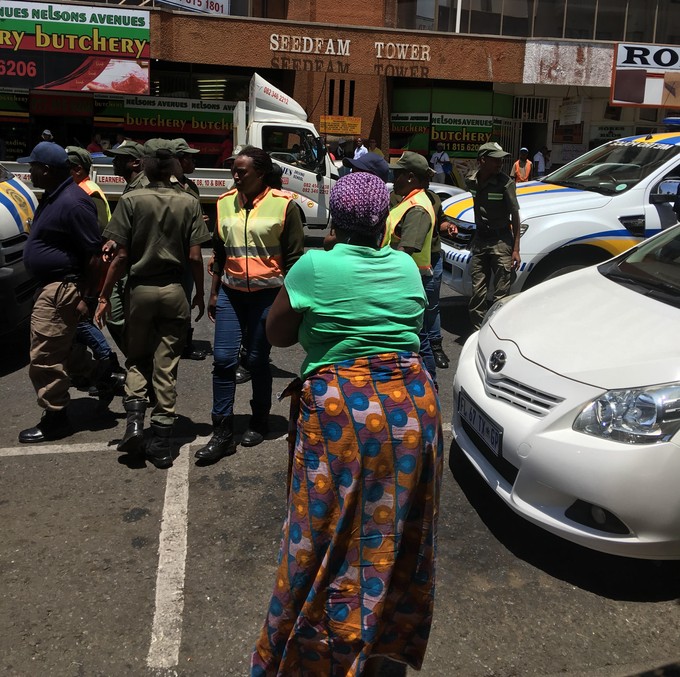
A vendor in Springs pleads for her confiscated goods to be returned. Photo: Kimberly Mutandiro
18 November 2016
“Metro Police! Run!” vendors shout at one another. It is 11am in Springs, and Ekhurhuleni Metro police have swooped on street vendors, confiscating their goods.
Two angry young men dressed in reflective vests, throw bricks at the police vans, then run as fast as they can to get away. They shout: “Kuanele mani (enough is enough)!”
An elderly vendor walks up to the police officers and begs for her tomatoes to be given back.
“Please, my children, give me back my stock. The grandchildren have nothing to eat at home,” she says. The officers at first ignore her.
Then one turns to her. “I understand your concern, Mama, but you know you are supposed to pay R50 fine because you are selling your goods illegally. Go and pay at the office and we will give you your tomatoes back. We are only doing our job.”
“But I do not have that money, my child. I ordered those tomatoes with my last R50. Please have mercy,” she says. “Last week, I gave money to the association for monthly rentals for this spot.”
“My hands are tied, Mama,” the officer says, shaking his head and walking away, leaving the vendor with tears in her eyes.
“We are working hard like everyone else to earn a living. What do they want us to do, steal?” asks Mama Mlambo. “Why should I pay a R50 fine. I belong to a hawkers’ association who allocated me this position. I am not selling illegally.”
“Some of us are too old to look for jobs. Who would employ an old woman like me? I am even lucky that I am still strong enough to go and stock tomatoes at the market and sell for myself. Life is too expensive these days. They should leave us to do our business in peace,” she says.
Mlambo has been operating as a vendor for the past three years, but the raids of late have made her life unbearable.
“I do not see anything wrong with vendors selling on the streets. With the high unemployment rate and expensive cost of living, it’s better for them to be allowed to sell their goods,” reasons a witness to the raid who gave his name as Emmanuel. “I am only against the fees taken from them by the so called associations - that’s daylight robbery. They are barely making enough to survive.”
He wonders how it is possible that the hawkers’ associations allocate spots to the sellers but cannot protect them from metro police.
Speaking to shop owners and employees in the town, some told GroundUp they felt vendors should pay a fee since shops paid rent.
Nomzamo Zondo of the Socio-Economic Rights Institute of South Africa (SERI) explains that metro police officials are entitled to impound or confiscate goods if an informal trader is trading in a prohibited area. But, she says, there is no authority to remove the informal trader even in cases where they are trading in prohibited areas.
According to the Springs Civic Centre, vendors can obtain permits at no cost by presenting their identity documents or passports and proof of residence. Asylum documents may also be used. If the vendor possesses a permit, metro police may not confiscate their goods.
But the reality is very few vendors in Springs actually have permits.